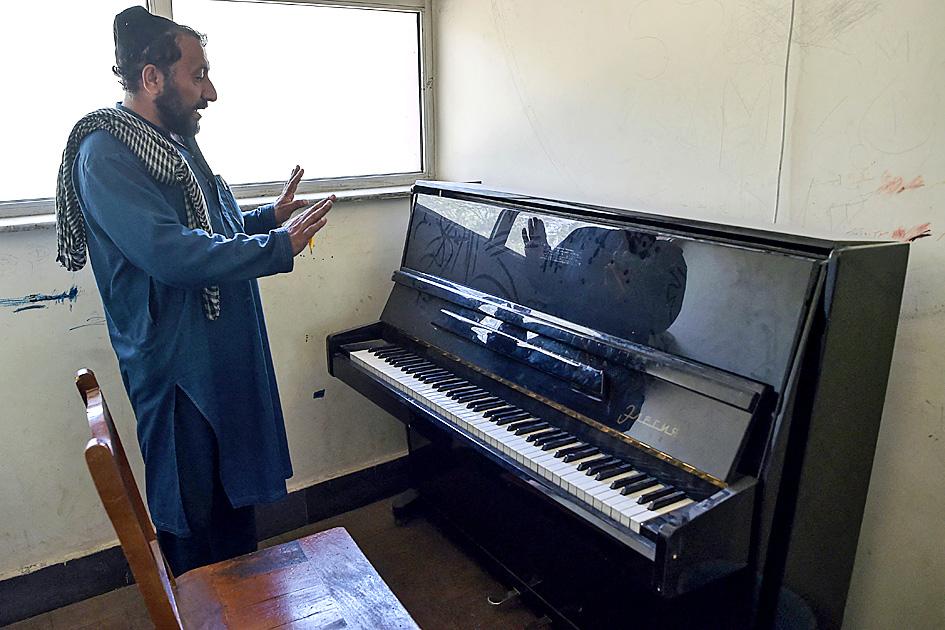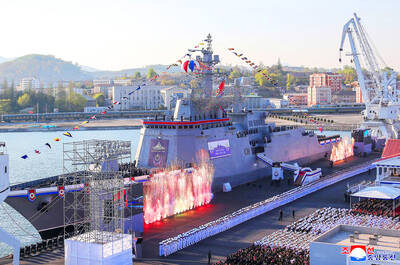Viola player Bahar was practicing at her music college in the Afghan capital, Kabul, when news broke that the Taliban had reached the city.
Terrified of a return to the days when music was forbidden and women were banned from education, she and her classmates rushed home, abandoning their beloved instruments.
“We all ran away. We saved ourselves, leaving the instruments at the institute,” Bahar said, using a false name to protect her identity for fear of reprisal. “I felt like I had lost a family member.”

Photo: AFP
The Taliban, who banned music outright during their brutal and oppressive rule from 1996 to 2001, swept back into power on Aug. 15.
They have promised a more moderate brand of rule this time — although they have made clear that they would run Afghanistan within the restrictive limits of their interpretation of Shariah law.
After racing home from the Afghanistan National Institute of Music (ANIM), Bahar was devastated to learn that Taliban militants had occupied the campus, turning its classrooms into dormitories.
“I feel like I am no longer living. Physically, I am alive, but the Taliban have taken away my soul,” she said, as she began to cry.
Bahar was introduced to the college when she was 12 years old, and she said that the viola quickly became her “best friend.”
“Music is food for the soul,” she said, adding that she has performed in Azerbaijan, India, Sweden and the UK.
“I feel extremely peaceful when I play the viola, especially when we play together in the girls’ orchestra,” she added.
During a visit by Agence France-Presse to the college, no music was heard in its corridors — all that was heard was the chatter and squabbling of Taliban soldiers.
Armed guards cradled Kalashnikovs in the courtyard, shaded by trees with swirling treble clefs spray-painted on to their trunks.
A Taliban guard showed off a storeroom full of intact musical instruments that were left behind, after reports that everything had been trashed.
The caretaker said that the group’s leaders had ordered him to protect the instruments.
Trumpets, saxophones and flutes were stacked on shelves, opposite violins and violas in cases, while dozens of Afghan tabla drums occupied another storage unit.
A workshop remained in the same state as when it was hurriedly vacated in the middle of last month — violins were lined up waiting for new strings, a cello laid mid-repair and tools were scattered around an electric keyboard.
Speaking in Kabul, 28-year-old guitarist Awa said that his room used to be stacked with musical instruments.
Fearing the Taliban, he has destroyed almost all traces of his musical career — except for one favorite guitar that he has hidden away.
The Kabul University graduate and tutor at ANIM has stopped posting to his YouTube channel where he used to upload lessons, and no longer replies to comments on his social media accounts.
He has performed with some of Afghanistan’s top music stars, but he worries for his family’s safety.
“It’s natural that if you were involved in music in Afghanistan you would be afraid. Sooner or later the Taliban will come after musicians,” said Awa, also using a pseudonym to protect his identity.
“Since they arrived, life has been hell. We had big dreams, but now our ambitions don’t exist anymore,” he said.
ANIM founder Ahmad Sarmast, who now lives in Australia, said that he fears for the future of Afghan music.
Since the takeover, he has written to the Taliban’s leaders to plead for access to music — especially for children.
“I hope they will allow us to continue to do our work for the best interests of the Afghan people,” he said.

Archeologists in Peru on Thursday said they found the 5,000-year-old remains of a noblewoman at the sacred city of Caral, revealing the important role played by women in the oldest center of civilization in the Americas. “What has been discovered corresponds to a woman who apparently had elevated status, an elite woman,” archeologist David Palomino said. The mummy was found in Aspero, a sacred site within the city of Caral that was a garbage dump for more than 30 years until becoming an archeological site in the 1990s. Palomino said the carefully preserved remains, dating to 3,000BC, contained skin, part of the

TRUMP EFFECT: The win capped one of the most dramatic turnarounds in Canadian political history after the Conservatives had led the Liberals by more than 20 points Canadian Prime Minister Mark Carney yesterday pledged to win US President Donald Trump’s trade war after winning Canada’s election and leading his Liberal Party to another term in power. Following a campaign dominated by Trump’s tariffs and annexation threats, Carney promised to chart “a new path forward” in a world “fundamentally changed” by a US that is newly hostile to free trade. “We are over the shock of the American betrayal, but we should never forget the lessons,” said Carney, who led the central banks of Canada and the UK before entering politics earlier this year. “We will win this trade war and

‘BODIES EVERYWHERE’: The incident occurred at a Filipino festival celebrating an anti-colonial leader, with the driver described as a ‘lone suspect’ known to police Canadian police arrested a man on Saturday after a car plowed into a street party in the western Canadian city of Vancouver, killing a number of people. Authorities said the incident happened shortly after 8pm in Vancouver’s Sunset on Fraser neighborhood as members of the Filipino community gathered to celebrate Lapu Lapu Day. The festival, which commemorates a Filipino anti-colonial leader from the 16th century, falls this year on the weekend before Canada’s election. A 30-year-old local man was arrested at the scene, Vancouver police wrote on X. The driver was a “lone suspect” known to police, a police spokesperson told journalists at the

North Korean leader Kim Jong-un has unveiled a new naval destroyer, claiming it as a significant advancement toward his goal of expanding the operational range and preemptive strike capabilities of his nuclear-armed military, state media said yesterday. North Korea’s state-run Korean Central News Agency (KCNA) said Kim attended the launching ceremony for the 5,000-tonne warship on Friday at the western port of Nampo. Kim framed the arms buildup as a response to perceived threats from the US and its allies in Asia, who have been expanding joint military exercises amid rising tensions over the North’s nuclear program. He added that the acquisition